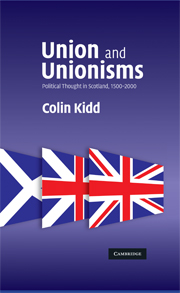Book contents
- Frontmatter
- Contents
- Preface
- 1 Introduction: the problems of Unionism and banal unionism
- 2 Unionisms before Union, 1500–1707
- 3 Analytic unionism and the issue of sovereignty
- 4 Narratives of belonging: the history and ethnology of organic union
- 5 From assimilationist jurisprudence to legal nationalism
- 6 The two kingdoms and the ecclesiology of Union
- 7 Early nationalism as a form of unionism
- 8 Conclusion
- Index
- References
2 - Unionisms before Union, 1500–1707
Published online by Cambridge University Press: 06 July 2010
- Frontmatter
- Contents
- Preface
- 1 Introduction: the problems of Unionism and banal unionism
- 2 Unionisms before Union, 1500–1707
- 3 Analytic unionism and the issue of sovereignty
- 4 Narratives of belonging: the history and ethnology of organic union
- 5 From assimilationist jurisprudence to legal nationalism
- 6 The two kingdoms and the ecclesiology of Union
- 7 Early nationalism as a form of unionism
- 8 Conclusion
- Index
- References
Summary
It is sometimes assumed that Scottish unionism is un-Scottish; that the ultimate provenance of this lap-dog ideology lies in an English desire to control the whole island of Britain, an alien cause which some self-interested or hireling Scots have nevertheless been willing to propagate. By extension, so this train of assumptions runs, Scottish unionism lacks native inspiration, being, at best, a de-factoist design to win over Scots to the brute fact that they find themselves in an English-dominated Union. However, Scottish unionism should not be crudely identified with English imperialism. As will become clear, historically these were antithetical positions. Indeed, Scottish unionism developed as a counterweight to English imperialism, proposing various schemes of Anglo-Scottish association as an alternative to claims of English dominance over Britain. Moreover, unionism also has an impeccably Scottish pedigree. Scottish unionism did not simply emerge in the aftermath of the Union of 1707 as a set of arguments to reconcile Scots to the British state. Neither, indeed, did it take its rise in the years immediately preceding the Union of the Parliaments in 1707, nor around the Union of the Crowns of 1603. Rather unionism predated Union. Articulate unionist political thought has a long history in Scotland which dates back to the early sixteenth century when Scotland was still an independent kingdom and union had no more substance than a utopian vision.
- Type
- Chapter
- Information
- Union and UnionismsPolitical Thought in Scotland, 1500–2000, pp. 39 - 80Publisher: Cambridge University PressPrint publication year: 2008



